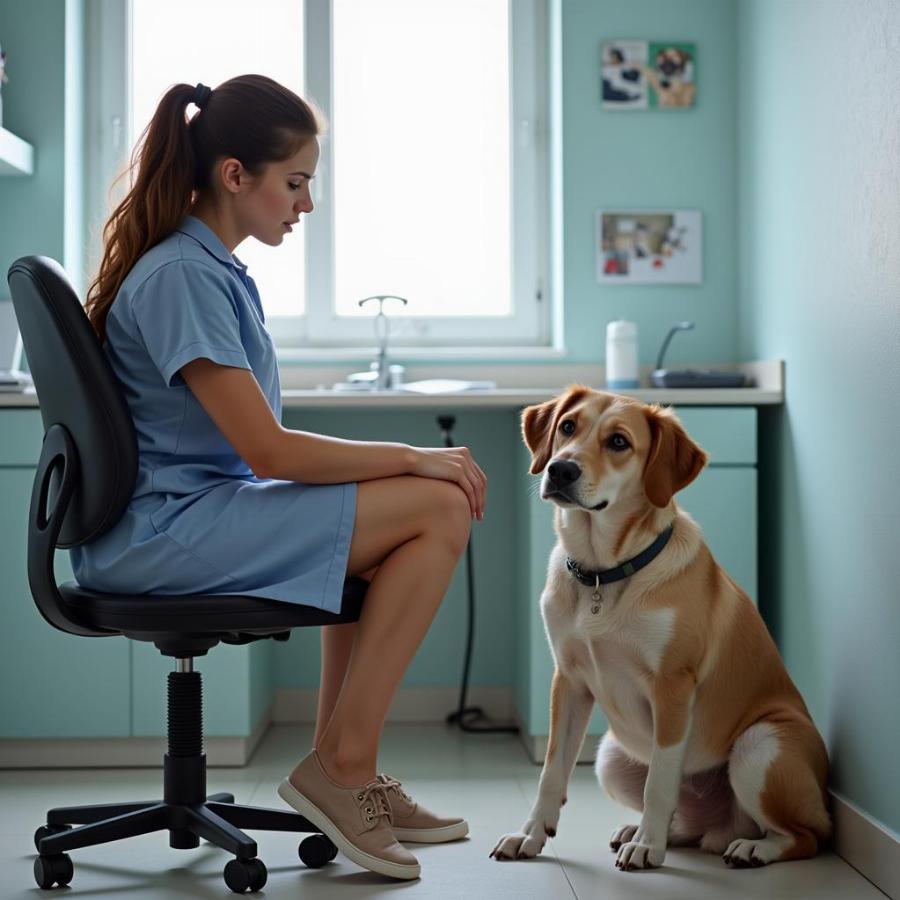Have you ever noticed your furry friend wagging their tail in their sleep and wondered what it means? It’s a common phenomenon that leaves many dog owners both curious and amused. While tail wagging is generally associated with happiness, it can actually signify a range of emotions in dogs, even during sleep.
This article will delve into the fascinating world of canine sleep behavior, exploring the reasons behind those adorable tail wags and whether they always indicate sweet dreams. We’ll also discuss when to pay closer attention to your dog’s sleep behavior and seek veterinary advice.
Decoding the Tail Wags: Dreams and More
Just like humans, dogs experience different sleep stages, including REM (Rapid Eye Movement) sleep, where dreams occur. During this stage, your dog’s brain is highly active, processing emotions, memories, and experiences from their waking hours.
Tail wags during sleep are often a reflection of these dreams. If your dog is chasing squirrels, playing fetch, or enjoying cuddles in their dream, their tail might start wagging involuntarily.
However, it’s important to remember that tail wags aren’t always a sign of happy dreams. Dogs can experience a range of emotions in their sleep, including anxiety, fear, or even aggression. In such cases, the tail wags might be accompanied by other behaviors like whimpering, growling, or muscle twitching.
Beyond Dreams: Other Reasons for Tail Wagging in Sleep
While dreams are a common explanation for sleep tail wags, there are other factors that can contribute to this behavior:
- Muscle Twitches: As dogs enter deep sleep, their muscles relax, and they may experience involuntary twitches, including tail wags.
- Scent Stimulation: Dogs have an incredibly sensitive sense of smell. Even faint scents in the environment can trigger a response, including tail wags, while they’re asleep.
- Physical Comfort: Sometimes, a simple change in sleeping position or a cozy bed can lead to contentment and a gentle tail wag.
When to Consult a Veterinarian
 Worried dog owner at the vet with their dog
Worried dog owner at the vet with their dog
While occasional tail wags during sleep are usually nothing to worry about, excessive or unusual sleep behaviors can sometimes indicate an underlying medical condition. It’s essential to consult a veterinarian if you notice any of the following:
- Frequent and intense tail wagging accompanied by vocalizations or muscle spasms.
- Changes in sleep patterns, such as increased restlessness or waking up frequently during the night.
- Excessive sleepiness or lethargy during the day.
- Any other unusual behaviors or signs of discomfort.
Understanding Your Dog’s Sleep Language
Paying attention to your dog’s sleep behavior can provide valuable insights into their overall well-being. Just like humans, dogs need adequate sleep to thrive.
By creating a comfortable and safe sleeping environment, establishing a regular sleep routine, and providing plenty of physical and mental stimulation during the day, you can help ensure your furry friend enjoys restful and peaceful nights.
FAQs:
Q: Is it normal for dogs to wag their tails in their sleep?
A: Yes, it’s perfectly normal for dogs to wag their tails while sleeping. It’s often a sign of dreaming, but it can also be a reflex or a response to scents or physical comfort.
Q: My dog wags their tail and whimpers in their sleep. Should I be concerned?
A: If your dog’s tail wags are accompanied by whimpering, it could indicate a bad dream or anxiety. While occasional episodes are usually not a cause for concern, frequent or intense episodes warrant a visit to the veterinarian.
Q: How can I tell if my dog is having a good dream or a bad dream?
A: A relaxed body posture, gentle tail wags, and soft whimpers or barks usually indicate a good dream. Conversely, tense muscles, rapid tail movements, growling, or yelping could suggest a bad dream.
Q: Can I wake my dog up from a bad dream?
A: It’s generally not recommended to wake a dog up suddenly from a bad dream, as this can startle them. Instead, try gently calling their name or making soothing noises to help them wake up naturally.
Q: What should I do if my dog’s sleep behaviors change suddenly?
A: Any sudden or drastic changes in your dog’s sleep patterns, such as increased restlessness, vocalizations, or excessive sleepiness, warrant a visit to the veterinarian to rule out any underlying medical conditions.
Need More Help?
For personalized advice and guidance on your dog’s health and well-being, don’t hesitate to reach out to Beaut Dogs. We’re here to support you and your furry friend every step of the way. Contact us at [email protected] for detailed and accurate answers to your questions.
Beaut Dogs is your ultimate destination for all things dog-related, offering reliable, insightful, and in-depth information about the canine world. Here, you’ll discover a wealth of knowledge about the characteristics, personalities, and care requirements of a wide array of dog breeds, from the popular to the rare and exotic. Visit https://beautdogs.com today to explore the wonderful world of dogs and learn how to care for them in the best possible way!